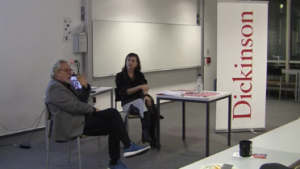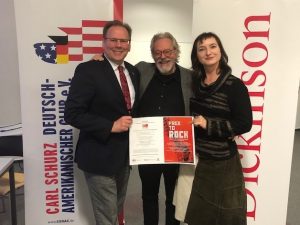by Zoey Tu ‘21
On November 13, a film event was held by the Durden Dickinson Program in Bremen, at the suggestion of the U.S. Consulate General Hamburg. It was also a featured event for all students who take German 340 “Comparative Cultures: USA-Germany.” In addition to the required reading materials in class, which mainly focused on political issues, the film offered a distinctive perspective of the American cultural influence in the communist world from the 1950s to the 1990s – how soft power played a significant role during the Cold War.
Doug Yeager, the producer of this documentary film, attended the event and was interviewed after the film by Dr. Janine Ludwig, Academic Director of our program. Yeager gave insights about his motivation for making this documentary and emphasized again the huge but unconscious power of music as well as other kinds of popular culture. He talked about the twelve-year process for the team to complete this documentary, which includes interviews with Jimmy Carter, the former president of the United States, and Mikhail Gorbachev, former leader of the Soviet Union, who both realized the significant role of rock bands in the USSR and recognized the idea of freedom behind this specific music genre.
 The 60-minute film introduced how rock music influenced the young generations in East Germany and the Soviet Union, explained how it was banned in the socialist world, and how it contributed to the collapse of the Iron Curtain. When rock music first came to the socialist world, it won great popularity among the youth. It awoke and inspired the young generations to demand the right to listen and play the music they loved and the right to express themselves freely. However, the idea of rock music – freedom and rebellion – was against the authoritarian governance of the Soviet Union.
The 60-minute film introduced how rock music influenced the young generations in East Germany and the Soviet Union, explained how it was banned in the socialist world, and how it contributed to the collapse of the Iron Curtain. When rock music first came to the socialist world, it won great popularity among the youth. It awoke and inspired the young generations to demand the right to listen and play the music they loved and the right to express themselves freely. However, the idea of rock music – freedom and rebellion – was against the authoritarian governance of the Soviet Union.
 It was a battle between two different ideologies: Democracy and Commu-nism. The US government hoped that rock music could be used as a certain means of propaganda. Looking at the results, this type of cultural propaganda was effective. The dissatisfaction among the Soviet public due to the censorship of rock music eventually led to movements as well as riots between the youth and the police, urging for freedom of expression. The idea of freedom, represented by rock music, also widely spread to the Baltic countries, since they demanded independence from Soviet control as well.
It was a battle between two different ideologies: Democracy and Commu-nism. The US government hoped that rock music could be used as a certain means of propaganda. Looking at the results, this type of cultural propaganda was effective. The dissatisfaction among the Soviet public due to the censorship of rock music eventually led to movements as well as riots between the youth and the police, urging for freedom of expression. The idea of freedom, represented by rock music, also widely spread to the Baltic countries, since they demanded independence from Soviet control as well.
Compared to other factors, the soft power of pop culture has been less discussed in public discourse when analyzing the causes of the collapse of the Soviet Union. However, it is an area that is worth further research. Therefore, the influence of US pop culture is included in the syllabus of the German 340 class, taught by Dr. Ludwig, and will be discussed further. Moreover, besides the required readings and the class discussion, the film is also a good supplement for the students to gain a better understanding of different cultural influences.
Please hear a sound bite here:
Please find the link to the movie presentation here: https://www.freetorockmovie.com/
and the poster here: Poster Free2Rock Bremen rev.0
A cooperation between the William G. and Elke Durden Dickinson Bremen Program, U.S. Consulate General Hamburg (specifically Dr. Susanne Wiedemann, Cultural Affairs Assistant), Carl Schurz German-American Club (specifically Ulf-Brün Drechsel, Vice President), the University of Bremen, especially the department English Speaking Cultures (specifically Dr. Karin Esders-Angermund), and the Institute for Cultural German Studies (ifkud).

